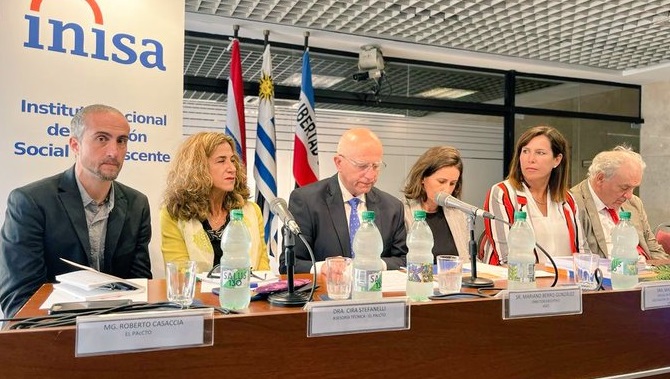The Italian expert Cira Stefanelli has been in charge of advising the National Institute for Adolescent Social Inclusion (NIASI) and presenting the Italian experience related to managing alternative measures to the deprivation of liberty. The aim has been to train staff on a crucial issue for prison management.
With support from EL PAcCTO, NIASI has created the first academy specialising in teenagers. Since its inception, it has been part of the Bi-regional Prison Academies Network (PAN) and it enables educators to develop skills for direct and permanent contact with the young people in institutions.
NIASI President Rosanna de Olivera believes that alternatives to the deprivation of liberty are effective and that prison should be the last resort. The number of adolescents currently in alternative measures outnumber those deprived of liberty. “There are 260 adolescents deprived of liberty and 353 adolescents under alternative measures,” she said, in reference to the Convention on the Rights of the Child.
EL PAcCTO and collaboration with Uruguay
Marta Ramírez, the European Union’s programme officer in Uruguay, also participated in the opening session, explaining that both the European Union and Uruguay share priorities, interests and concerns in the areas of security, organised crime, justice, drug trafficking and the prison system. There are mechanisms for permanent dialogue with key actors related to these issues, as well as programmes that are being implemented in these areas.
Also present at the inauguration were the Director of NIASI, Rosario Pérez, the parliamentary commissioner, Juan Manuel Petit; the representative of the National Rehabilitation Institute (NRI), Lourdes Salinas and, representing EL PAcCTO, the experts Cira Stefanelli and Roberto Casaccia; and the Executive Director of the Uruguayan Agency for International Cooperation (UAIC), Mariano Berro.
First meeting of the Paraguayan ITC on Alternative Measures
The main objective of the meeting of the Inter-Institutional Technical Committee in Paraguay was to analyse alternative measures to imprisonment in order to, among other results, reduce overcrowding in prisons. The Italian anti-mafia prosecutor expert, Mario Palazzi, has been in charge of advising and explaining the procedures applied in his country in order to adapt the best practices on electronic alternative measures to the Paraguayan model.
At the opening, the Minister of Justice, Luis María Benítez Riera, on behalf of the Supreme Court of Justice, thanked the EL PAcCTO programme for these five years of strengthening and support, because “it allows us to give impetus to certain issues that really go deep into the legal system, especially with regard to precautionary measures”, he said.
He stressed that, through a joint project with the programme, a criminal justice system was integrated and that this has borne fruit, as the CSJ adopted this system with the law enacted in 2019 on alternative substitute measures. “I would point out that they provide us with tools to deal with organised crime and overcrowding, which lead to other problems,” he said.
For his part, José María Cueto, Cooperation Attaché for the EU delegation in Paraguay, recalled that, alongside other programmes, the idea of implementing alternative measures to imprisonment had been launched. “EL PAcCTO ends in December, after five years, but much remains to be done, so it will continue with a second phase,” he stated.
Likewise, Letizia Sanabria, the head of the office of the Vice-Ministry for Criminal Policy, said “what we are looking for is to reduce overcrowding in prisons, and we believe that this can be achieved through this measure”.
